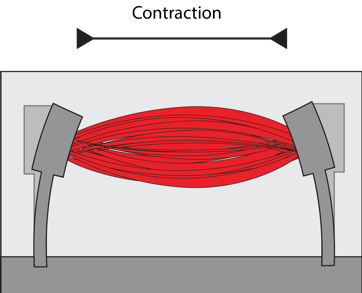Muscle-on-a-chip model for FSHD
Background
Facioscapulohumeral muscular dystrophy (FSHD) is a progressive muscle disease for which no cure is available. FSHD is caused by the misexpression of the transcription factor DUX4 in skeletal muscle. How DUX4 expression leads to muscle pathology is still largely unknown. A major focus of our research is to translate research findings into suitable applications for patients with FSHD. For example, we aim to develop novel treatment options by targeting changes that occur in the cell because of the disease. Until now, we have used 2D patient-derived cell cultures and FSHD animal models for this type of research. However, these models do not fully recapitulate the disease. In addition, the Dutch government is actively stimulating animal-free research. In this project, we generate 3D miniature muscles in a chip, the muscle-on-a-chip model.
Fig. Cartoon of the muscle-on-a-chip model.
Methods
We apply genetic, molecular and cellular techniques to model FSHD using skeletal muscle cells generated from induced pluripotent stem cells of healthy individuals and patients with FSHD. These skeletal muscle cells are next grown under 3D conditions giving us the opportunity to measure parameters such as the force generated by a miniature muscle that cannot be determined under 2D conditions.
Relevance
The muscle-on-a-chip model enables us to determine the relationship between DUX4 expression and skeletal muscle pathology. In addition, it will accelerate the development of therapeutic strategies for neuromuscular disorders, including for FSHD.
Financiering: Prinses Beatrix Spierfonds; Health-Holland




